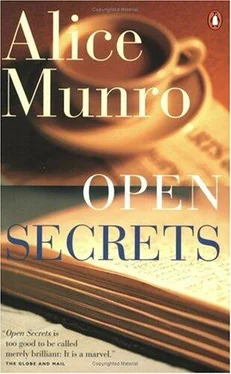She opens the front door for him and he says, “Thank you,” in his stiff, quaintly repentant way. As he goes past, he bends and purses his lips at the air close to her cheek.
They’ve gone, there’s nobody sitting on the wall now.
Heather Bell will not be found. No body, no trace. She has blown away like ashes. Her displayed photograph will fade in public places. Its tight-lipped smile, bitten in at one corner as if suppressing a disrespectful laugh, will seem to be connected with her disappearance rather than her mockery of the school photographer. There will always be a tiny suggestion, in that, of her own free will.
Mr. Siddicup will not be any help. He will alternate between bewilderment and tantrums. They will not find anything when they search his house, unless you count those old underclothes of his wife’s, and when they dig up his garden the only bones they will find will be old bones that dogs have buried. Many people will continue to believe that he did something or saw something. He had something to do with it . When he is committed to the Provincial Asylum, renamed the Mental Health Centre, there will be letters in the local paper about Preventive Custody, and locking the stable door after the horse is stolen.
There will also be letters in the newspaper from Mary Johnstone, explaining why she behaved as she did, why in all good sense and good faith she behaved as she did that Sunday. Finally the editor will have to let her know that Heather Bell is old news, and not the only thing the town wants to be known for, and if the hikes are to come to an end it won’t be the worst thing in the world, and the story can’t be rehashed forever.
Maureen is a young woman yet, though she doesn’t think so, and she has life ahead of her. First a death — that will come soon — then another marriage, new places and houses. In kitchens hundreds and thousands of miles away, she’ll watch the soft skin form on the back of a wooden spoon and her memory will twitch, but it will not quite reveal to her this moment when she seems to be looking into an open secret, something not startling until you think of trying to tell it.
On the runway, in Honolulu, the plane loses speed, loses heart, falters and veers onto the grass, and bumps to a stop. A few yards it seems from the ocean. Inside, everybody laughs. First a hush, then the laugh. Gail laughed herself. Then there was a flurry of introductions all around. Beside Gail are Larry and Phyllis, from Spokane.
Larry and Phyllis are going to a tournament of Left-handed Golfers, in Fiji, as are many other couples on this plane. It is Larry who is the left-handed golfer — Phyllis is the wife going along to watch and cheer and have fun.
They sit on the plane — Gail and the Left-handed Golfers — and lunch is served in picnic boxes. No drinks. Dreadful heat. Jokey and confusing announcements are made from the cockpit. Sorry about the problem. Nothing serious but it looks like it will keep us stewing here a while longer . Phyllis has a terrible headache, which Larry tries to cure by applying finger-pressure to points on her wrist and palm.
“It’s not working,” Phyllis says. “I could have been in New Orleans by now with Suzy.”
Larry says, “Poor lamb.”
Gail catches the fierce glitter of diamond rings as Phyllis pulls her hand away. Wives have diamond rings and headaches, Gail thinks. They still do. The truly successful ones do. They have chubby husbands, left-handed golfers, bent on a lifelong course of appeasement.
Eventually the passengers who are not going to Fiji, but on to Sydney, are taken off the plane. They are led into the terminal and there deserted by their airline guide they wander about, retrieving their baggage and going through customs, trying to locate the airline that is supposed to honor their tickets. At one point, they are accosted by a welcoming committee from one of the Island’s hotels, who will not stop singing Hawaiian songs and flinging garlands around their necks. But they find themselves on another plane at last. They eat and drink and sleep and the lines to the toilets lengthen and the aisles fill up with debris and the flight attendants hide in their cubbyholes chatting about children and boyfriends. Then comes the unsettling bright morning and the yellow-sanded coast of Australia far below, and the wrong time of day, and even the best-dressed, best-looking passengers are haggard and unwilling, torpid, as from a long trip in steerage. And before they can leave the plane there is one more assault. Hairy men in shorts swarm aboard and spray everything with insecticide.
“So maybe this is the way it will be getting into Heaven,” Gail imagines herself saying to Will. “People will fling flowers on you that you don’t want, and everybody will have headaches and be constipated and then you will have to be sprayed for Earth germs.”
Her old habit, trying to think up clever and lighthearted things to say to Will.

After Will went away, it seemed to Gail that her shop was filling up with women. Not necessarily buying clothes. She didn’t mind this. It was like the long-ago days, before Will. Women were sitting around in ancient armchairs beside Gail’s ironing board and cutting table, behind the faded batik curtains, drinking coffee. Gail started grinding the coffee beans herself, as she used to do. The dressmaker’s dummy was soon draped with beads and had a scattering of scandalous graffiti. Stories were told about men, usually about men who had left. Lies and injustices and confrontations. Betrayals so horrific — yet so trite — that you could only rock with laughter when you heard them. Men made fatuous speeches ( I am sorry, but I no longer feel committed to this marriage ). They offered to sell back to the wives cars and furniture that the wives themselves had paid for. They capered about in self-satisfaction because they had managed to impregnate some dewy dollop of womanhood younger than their own children. They were fiendish and childish. What could you do but give up on them? In all honor, in pride, and for your own protection?
Gail’s enjoyment of all this palled rather quickly. Too much coffee could make your skin look livery. An underground quarrel developed among the women when it turned out that one of them had placed an ad in the Personal Column. Gail shifted from coffee with friends to drinks with Cleata, Will’s mother. As she did this, oddly enough her spirits grew more sober. Some giddiness still showed in the notes she pinned to her door so that she could get away early on summer afternoons. (Her clerk, Donalda, was on her holidays, and it was too much trouble to hire anybody else.)
Gone to the Opera .
Gone to the Funny Farm .
Gone to stock up on the Sackcloth and Ashes .
Actually these were not her own inventions, but things Will used to write out and tape on her door in the early days when they wanted to go upstairs. She heard that such flippancy was not appreciated by people who had driven some distance to buy a dress for a wedding, or girls on an expedition to buy clothes for college. She did not care.
On Cleata’s veranda Gail was soothed, she became vaguely hopeful. Like most serious drinkers, Cleata stuck to one drink — hers was Scotch — and seemed amused by variations. But she would make Gail a gin and tonic, a white rum and soda. She introduced her to tequila. “This is Heaven,” Gail sometimes said, meaning not just the drink but the screened veranda and hedged back yard, the old house behind them with its shuttered windows, varnished floors, inconveniently high kitchen cupboards, and out-of-date flowered curtains. (Cleata despised decorating.) This was the house where Will, and Cleata too, had been born, and when Will first brought Gail into it, she had thought, This is how really civilized people live. The carelessness and propriety combined, the respect for old books and old dishes. The absurd things that Will and Cleata thought it natural to talk about. And the things she and Cleata didn’t talk about — Will’s present defection, the illness that has made Cleata’s arms and legs look like varnished twigs within their deep tan, and has hollowed the cheeks framed by her looped-back white hair. She and Will have the same slightly monkeyish face, with dreamy, mocking dark eyes.
Читать дальше













